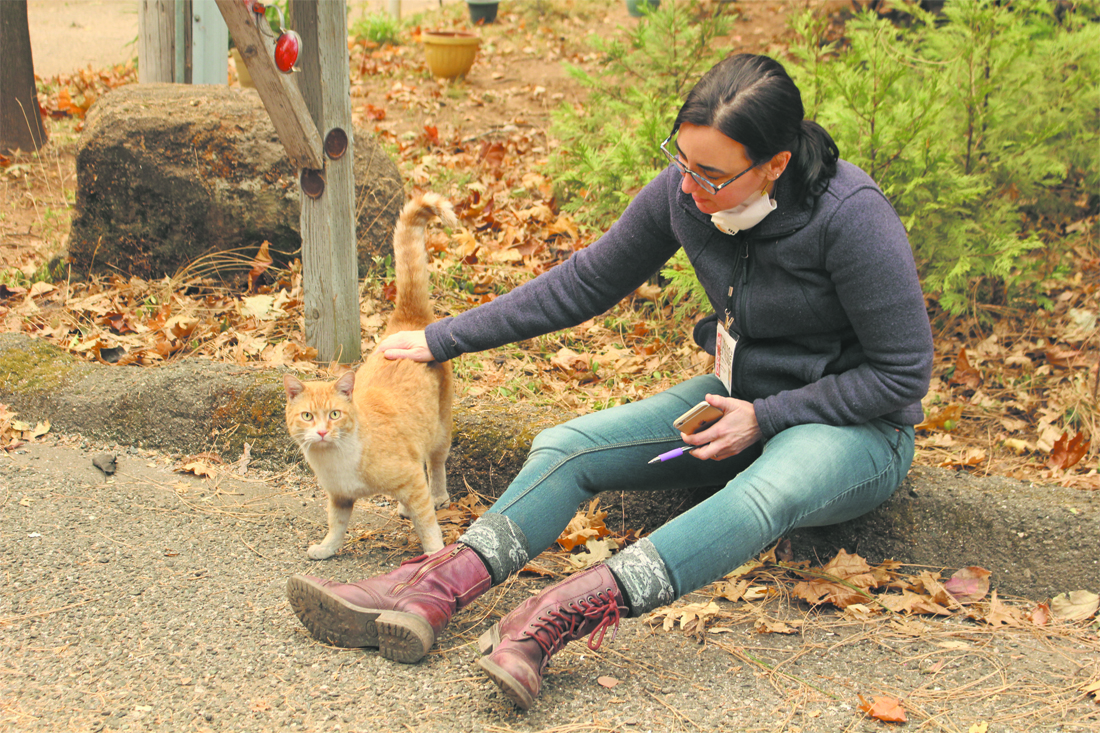
Photo by Ken Smith
CN&R Editor Melissa Daugherty and one of the cats she befriended in Magalia while the Ridge was closed to the public.
Everyone on the Ridge had a job to do in the first days and weeks after the Camp Fire, when the smoldering foothills were cordoned off to the public.
Firefighters swept pine needles off roofs and out of gutters to keep the buildings left standing from catching fire. Police officers, sheriffs’ deputies and park rangers patrolled for looters. Utility workers picked up what was left of power lines. Forensic teams turned over twisted pieces of metal and other debris, searching for human remains.
The task before me was to take pictures and notes—to bear witness to the devastation. At least, that’s what I thought at the time. That’s what I was conditioned to do. Trained to do. But the disaster didn’t resemble anything I’d experienced in my career. I was overwhelmed by its enormity—the thousands of stories of people and places and pain and loss.
I could process it only in pieces —snapshots of what I saw, heard and smelled. The shroud of toxic smoke hanging over the ashes of burned houses and the husks of abandoned, charred cars in the middle of the streets. The sound of exploding propane tanks. The smell of burned rubber and leaking gas, its rattlesnake-like hiss warning me to step away.
My eyes were drawn to color—to the few things in the grayness that hadn’t burned. The unscathed red bicycle in the rack at the razed elementary school. The green seesaw on a lot where only a chimney stood.
The CN&R’s Meredith Cooper drove me through Paradise the morning after the fire broke out, crossing lanes to dodge low-hanging wires from power poles snapped like twigs. It took hours to survey the major destinations, including the remnants of the Gold Nugget Museum.
That night a stranger sent me a link to a video without warning me of its graphic footage of bodies. I realize Meredith and I likely had driven right past them hours earlier. A battle with insomnia hit immediately. The images and sleeplessness haunt me to this day.
My coping mechanism at the time: looking for animals. Something alive, something to help. Meredith and I had seen deer and a squirrel with a scorched tail during that first trip. We drove home bearing the thousand-yard stare.
Arts Editor Jason Cassidy and I drove up there the next day, Saturday. Among our many destinations was a pit stop along a scorched roadway where I jumped out to grab a frightened black cat. Gus was reunited with his people after some veterinary care a few months later.
Sunday I returned with former staff writer Ken Smith. Midway into our trip, a big rust-colored chicken ran up to me, close enough to touch. Others in the flock hung back. I retrieved bottled water from Ken’s car and filled up one of the plastic bowls I’d brought.
I had cat food, but no chicken scratch. Deeper on the property, I spotted an awning with the sort of container used for livestock feed. This presented an ethical quandary—whether to trespass onto private property or let the hungry birds fend for themselves. I went with my gut—my heart, I suppose.
Up in a Magalia neighborhood, we spotted two orange cats. More food, more water. Then solo trips every couple of days for refills until animal rescue groups took over.
Each night, as I drove home to my sweet husband and son through what felt like tule fog, the Chico streets I’d driven every day for years suddenly felt unfamiliar. Sometimes I’d miss my turn or a stop sign seemed to appear out of nowhere. The toxic haze still hung thick, but my mind was cloudy, too—overwhelmed by the destruction and trauma happening all around me.
In my office in those early days of triage reporting, I struggled with the question of how the team of journalists I lead should tell the stories to help survivors.
More than a year later, compartmentalization an ongoing struggle, the same answer reveals itself: one at a time.
